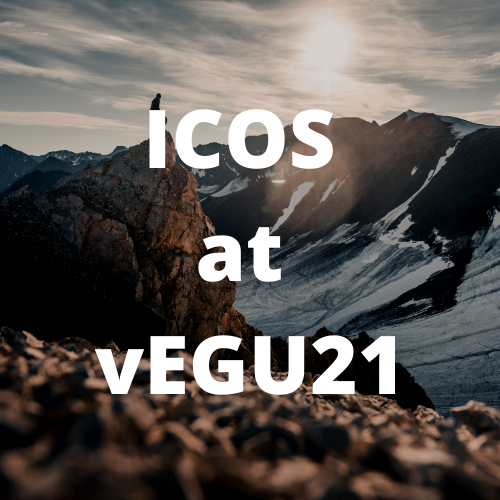
European Geosciences Union (EGU) General Assembly 2021, traditionally held each spring in Vienna, Austria, takes place entirely online due to the continuing risks posed by the coronavirus pandemic and the resulting restrictions on international travel.
Presentations by the ICOS community listed by time and date are:
- 21st April, 11:30-12:30 CEST Radiocarbon in modern carbon cycle research. Alfred Wegener Medal Lecture by Ingeborg Levin
- 27th April, 13:43-13:45 CEST ICOS Science Conference 2020 vPICO presentation by Janne-Markus Rintala
- 28th April, 11:00-12:30 CEST The ICOS Ocean Thematic Centre, what it is, how it operates and what it can do to help you supply the data we need to quantify ocean carbon uptake. Townhall meeting by Richard Sanders
Presentations of interest for the ICOS community:
- 29th April, 11:35-11:37 CEST Hack the Arctic: transforming data into solutions as a community. vPICO presentation by Stephany Buenrostro Mazon
- 30th April, 14:15-14:25 CEST GERI – The emerging Global Ecosystem Research Infrastructure. Presentation by Jaana Bäck
Sessions convened by someone from the ICOS community are listed below. Click on each session title to learn more about the session theme and the conveners. Visit the vEGU21 website for more practical information.
Other :
- From 26th April to 15th September 2021 Virtual #ICOScapes Photo Exhibition
The UN 2030 Agenda for Sustainable Development is an urgent call for a global partnership for action. The new paradigm of the Paris Agreement puts additional responsibility on scientists to provide data and knowledge to inform climate action for the benefit of society. Together with the other UN conventions (on biological diversity and on disaster risk reduction), these frameworks are highly dependent on evidence-based information derived from geosciences. After having developed crucial capacities on the regional level, Research Infrastructures and other data providers need to upgrade their cooperation efforts and coordinate their actions on the global level. They must ensure a sustainable production of data, products and services in line with the demands of the decision-makers. To deliver on the expectations of the UN system in support of policy-makers, actors from different disciplines (observation, modeling, reporting…) have to intensify their collaborative efforts.
In this session, we welcome abstracts presenting the recent developments in international cooperation efforts, global integration of data sets, initiatives to support climate services and especially the Monitoring, Reporting and Verification mechanism of the Paris Agreement. We also wish to stage the role of disciplines belonging to the human and social fields in achieving the objective.
Share: https://meetingorganizer.copernicus.org/EGU21/session/40713
Convener: Emmanuel Salmon | Co-conveners: Michael Mirtl, Beryl Morris, Xiubo Yu
Observations and simulations of the terrestrial carbon and water budget are fundamental to understanding biosphere-atmosphere interactions under a changing climate. Multiple processes determine how mass and energy exchange scale from the level of a leaf, to the whole plant, to the ecosystem level, and to the globe. Empirical studies are subject to the level at which observations are collected, and models imply a choice regarding the scale for which predictions are representative. Recent research has revealed systematic differences between observations taken at different levels, e.g., regarding exchange fluxes of carbon and water between the biosphere and the atmosphere. This can add to model-data mismatch and limits process understanding.
This session aims at bridging terrestrial ecosystem observations across multiple temporal and spatial scales and from multiple variables. We particularly invite research with a focus on how we can learn from multiple observations of carbon and water exchange fluxes.
We encourage contributions with a focus on process modelling, machine learning, or with an empirical focus that aims at learning from parallel measurements, captured at the leaf (e.g. gas exchange), tree (e.g. sap flow and tree growth, dendroecology), and/or ecosystem level (eddy covariance towers, UAVs, aircrafts and satellites).
Share: https://meetingorganizer.copernicus.org/EGU21/session/38838
Convener: Mana GharunECS | Co-conveners: Arthur Geßler, Rossella Guerrieri, Corinna Rebmann, Benjamin StockerECS
Managed agricultural ecosystems (grassland and cropland) are an important source and/or sink for greenhouse gases (GHG) as well as for reactive trace gases. Due to the simultaneous influence of various environmental drivers and management activities (e.g. fertilizer application, harvest, grazing) the flux patterns are often complex and difficult to attribute to individual drivers. Management related mitigation options may often result in trade-offs between different GHG or between emission of GHG and reactive gases like NH3, NO, or VOCs.
The session addresses experimentalists and modelers working on carbon and nitrogen cycling processes and related fluxes on plot, field, landscape, and regional scale. It is open to a wide range of studies including the development and application of new devices, methods, and model approaches as well as field observations and process studies.
Particularly welcome are studies on the full carbon, nitrogen or GHG budgets, as well as studies comparing GHG and reactive gas exchange. We also encourage contributions about emission factors for relevant gases.
Share: https://meetingorganizer.copernicus.org/EGU21/session/38839
Convener: Christof Ammann | Co-conveners: Christian Brümmer, Eliza Harris
Being bullied or harassed at your workspace has a tremendous impact on both the professional and the personal wellbeing of the person subjected to such treatment.
Which acts and behaviours classify as bullying and harassment? How can you recognize if you or a co-worker/friend are the target of bullying and harassment? How can you protect yourself and others from bullying and harassment? What can we all together do to stop harmful behaviours from individuals or overarching structures? What do institutions need to do in order to create a healthy and safe work environment?
These questions and more will be addressed during this ECS Great Debate, which shall raise awareness for the harmful effects of bullying and harassment in academia, provide clarity around this complex matter, and encourage people to speak up and take action against it. Through round-table discussions we will talk about what is needed to create a healthy, safe and inclusive work environment for everyone, where bullying, any form of harassment and intimidation have no place.
Share: https://meetingorganizer.copernicus.org/EGU21/session/39992
Convener: Anouk BeniestECS | Co-conveners: Derya GürerECS, Simone M. Pieber, Elenora van RijsingenECS